
this book is from
the
timeperiod
long
before Atlantis
was
crushed by
the
asteroid
that
created
those
super-killer-waves.
videolink with english talk on how Atlantis went down acc.
to Semjase/Erra-pleiadians
|
A Dweller on
Two Planets or The Dividing of the Way was
released by Phylos the Tibetan, through Frederick S. Oliver (1866-1899)
as His amenuensis over a period of three years, beginning in 1883. It
was completed in 1886 and published in 1905.
This book goes into great
detail about the employment of "dark-side" energy (which today would
be called "zero point energy"), antigravity, mass transit, and devices
such as voice-operated typewriters. Phylos the Tibetan spoke of a
cigar-shaped, highly maneverable Atlantean flying machine, called a
vailx, which amazingly resembles numerous 20th century UFO reports.
Atlantis was portrayed as a culture which reached a high level of
scientific advancement and technology.
Phylos portrays a first person account of
Atlantean culture which had reached a high level of technological and
scientific advancement. His personal history and that of a group of
individuals with whom Phylos closely interacted is portrayed in the
context of the social, economic, political and religious structures
which shaped Poseid society. Daily life for Poseidi citizens included
such things as antigravity air and submarine craft, television,
wireless telephony, arial water generators, air conditioners and high
speed rail. The book deals with deep esoteric subjects including karma
and reembodiment and describes Phylos' final incarnation in 19th
century America where his Atlantean karma played itself out. In that
incarnation (as Walter Pierson, gold miner and student of Adepts) he
travelled to Venus (Hesperus) in a subtle body while his physical form
remained at a temple inside Mt Shasta. Describing his experience with
the Hesperian Adepts, Phylos relates many wonders including artworks
depicting three dimensional hologram scenes that appeared alive.
In a detailed personal history of
Atlantis and 19th century North America, Phylos draws the threads of
both lifetimes together in familiar and initiatic terms revealing
equally their triumphs and failures and exposing the cause and effects
of karma from one lifetime to another. His life story is written in
personal testimony of the law: "whatsoever a man soweth, that shall he
also reap" and as a warning to this technological age to not repeat
the mistakes of the past which lead to the cataclysmic destruction of
Atlantis ("Poseid, queen of the waves").
" Yes, we were Atlanteans and even
Lemurians, but we are also citizens of Venus who have come bearing the
Christ in our hearts and the culture of the Mother, which has brought
forth such beauty, such crystallization in Matter of the glories of
the Spirit. [on our planet, that you might cultivate that Christ of
the Heart and that culture of the Mother on Earth]. Now, beloved, I
address you as an Ascended Master and therefore may speak through this
Messenger. I am grateful that many have profited from my book, even
though there may be a percentage of error resulting from my or
another's perceptions. Yet, beloved, these records are true and I bear
witness, and I bear witness to much more than that which was written.
. . . .
". . . . I say the Quality of
God-Happiness is essential to meet adversity, but the pleasure of the
senses in excess does surely detract from the straight and the narrow
way. Thus, may your forces be focused that you might not perceive your
karma alone but have an eye and an ear for others who suffer and,
[taking Divine pity upon them,] say thereby, 'There but for the grace
of God go I.'
"May you see yourself in every life
who suffers. May you know that as long as life suffers, a part of you
is suffering with that life, for God is One. May you understand, as
the leaves of my book have given up much profound teaching through the
Messenger, that the path to be walked is worth every joy that you
encounter and every sorrow. For you are sending energy back to God and
receiving it again. And as quickly as you send to God Light for the
transmutation of error, so as quickly does he send to you Light that
is Truth incarnate within you. And this oscillation from your heart to
the center of the Sun of your I AM Presence, to the center of the
Great Central Sun is the beginning of the acceleration process whereby
you shall know that oscillation to the point of the speed of Light and
then beyond. . . . "
" . . . . America is beset with the
karma that the nation has made since its inception two centuries ago.
It is beset with ancient records of Atlantis not yet paid. And it is
bowed down by a false teaching that is not that of the Christ
concerning this karma, concerning accountability. So many false
teachers abound and so little discrimination is exercised, even in the
New Age movement. Wherever there is a claim or a personality or a new
fad or some other exploration into the psychic, there do they run like
chickens for feed.
"Blessed Hearts, find the Truth of
Being in yourself. Find others who have that truth of Being. And watch
out, for the disease of the carnal mind is idolatry. Most people on or
off the spiritual path are idolatrous of themselves, quite pleased
with their meager knowledge and even less attainment, which they deem
to be great. Know ye not that the first step on the Path is one of
humility and self-effacement? The first step beyond this is
forgiveness toward all life.
"Do not jump into the arena of
learning to be a psychic channel. Do not jump into those areas where
you again jeopardize the soul. For this channeling is a form of
spiritism and it does rob you of the very sheath of light that does
protect the physical body and the chakras, and this energy once spent
is not replenished. Thus, when you experience exhaustion instead of a
recharge in the presence of a channel, know that your energy is being
drained to sustain that communication, which cannot be from an
Ascended Master if it does drain you. . . . "
Beloved Ascended
Master Phylos the Tibetan
through the
Messenger, Elizabeth
Clare Prophet,
April 28, 1991,
this part is from:
http://www.ascension-research.org/Phylos.html
l
link to the whole book in pdf |
| |
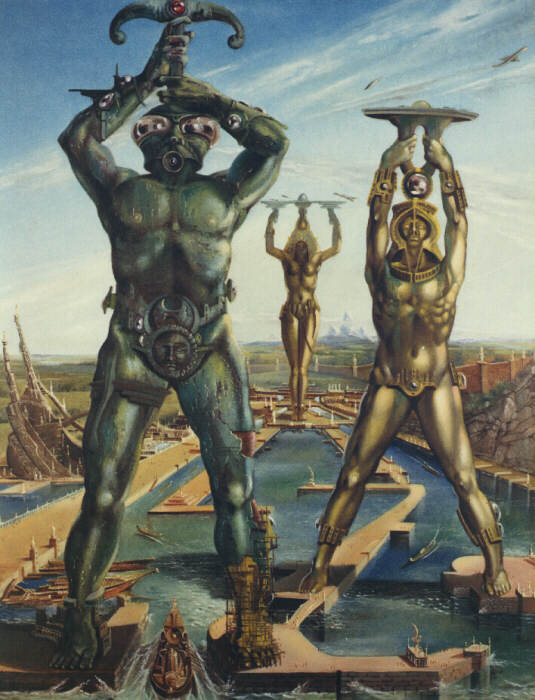
this art-picture of the port/harbour of POSEIDON
-- is made after a
timetravel to Atlantis - allegedly done by an artist connected with the
DAMANHUR-CENTER IN ITALY - make it bigger by cliking on it. Remark the
landingplatforms for the ufo's they had.
Review
BELOW is by Associate Robert W. Wilson of
Frederick S. Oliver’s “A Dweller on Two Planets, or Dividing of the
Way” — brought in Journal of Borderland Research (Vol. 17, No. 5, July –
August 1961)
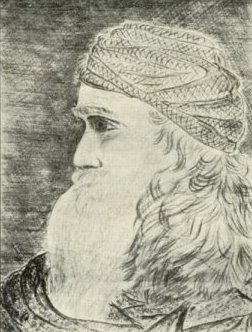
The publication of another edition of that classic of occult
literature, “A Dweller on Two Planets,
or The Dividing of the Way”,(alt.online)
by Phylos the Tibetan, prompts the
present review for the benefit of a new generation of readers, as well
as for older ones who have not yet read this remarkable work.
The copyright notices in earlier editions indicate the book was
first published in 1894. The preface states that it was written in
California between 1884 and 1886 by Frederick S. Oliver under the
spirit guidance of Phylos, who after many earthly lives now works in
and from the
higher realms.
The work is a fascinating account of the two most significant
incarnations of Phylos and his nearest companions, showing by these
“case histories” the action of the law of Karma, “whatsoever a man
soweth, that shall he also reap”, both good and bad. The laws of the
Spiritual Universe, whereby humans are rewarded for their good deeds,
and move toward the ultimate elimination of evil by working out the
consequences of their had actions, are shown in their slow but
unfailing application to individuals. The book is replete with
explanations of such problems as the atonement, forgiveness of sins,
the “spiritual mechanics” of physical death and of life in the
successively expanding post-mortem conditions. Certain episodes will
be particularly enlightening to readers who have been led by Jesus’s
words, “before Abraham was, I am”, to ponder on the relation of the
Timeless Christ to the inhabitants of the earth before His
manifestation in Judea.
The swiftly moving story paints an absorbing picture of the customs
and daily life in the heyday of a great Atlantean culture, when they
utilized scientific knowledge which the present world is just now
regaining.
The successive life histories narrate, first the short but
brilliant career of Zailm Numinous, born about thirteen thousand years
ago in a family of Atlantean mountaineers; and second the final
incarnation of the same soul as Walter Pierson in time to fight in the
American Civil War, to mine gold in the Mount Shasta region in the
late 1860s, and at last to die in a shipwreck off Bermuda about 1880.
This was four years before he began the writing of this book through
the hand of Mr. Oliver. Many intermediate life-times are omitted.
A courageous and ambitious youth, Zailm, after early gaining a
fortune in a mining enterprise, attracts the attention of the emperor,
wins his way into the highest court circles, and while yet in his
twenties is entrusted with a delicate diplomatic mission. Success in
this puts him in line for appointment as Viceroy of an important
distant kingdom brought into the Atlan empire, but before entering on
his duties he is to wed the emperor’s niece, Anzimee. The brilliant
wedding is interrupted by the entrance of Zailm’s mistress, Lolix,
herself a young woman of sufficiently high social position to have
been a suitable wife. Zailm had deceived her into believing that her
foreign birth was a bar to marriage. The fact that she had born him
children had been well concealed, and her great devotion led her to
agree to his marriage to Anzimee, although her heart was broken. But
her mind gives way under the grief.and she goes distraught to the
temple. There in a highly dramatic scene she attempts to stab Zailm
and herself, that they may be united in death. Furious at the
disruption of the ceremony, Mainin, the high priest, fatally curses
Lolix, turning her into stone on the spot.
METAMORPHOSIS
For many weeks Zailm wanders aimlessly about, suffering intense
remorse. At last he falls into a trance, during which he finds Lolix
in the spirit world, carrying in her arms the bloody ghost of her
second child, whom she had killed for Zailm’s sake. Although Zailm had
been unaware of his second infant, he assumes full responsibility for
the destruction of its physical life. His bitter and sincere
repentance for his duplicity to Lolix, with his willingness to take
upon himself the burden of her guilt, bring both to a spiritual
awakening wherein they perceive Christ present with them. After
telling them that in a far distant day they will be given opportunity
to make amends for their sins He releases Lolix to realms of peace,
while Zailm returns to the duties of the world.
Recovering mental and physical health, Zailm leads a small
expedition to what is now known as South America in search of gold
mines to enhance the imperial revenues. Away from his party he gets
entrapped in an ancient tunnel where he perishes miserably of thirst
and hunger. As he lies dying the high priest, Mainin, materializes
before him, taunts him, and tells him that his entrapment resulted
from the priest’s hypnotic influence, and that both his approaching
death and the turning of Lolix to stone are mere incidents in Mainin’s
design to thwart the humanitarian projects of the Atlan emperor. The
fact that Mainin, under cloak of his office, had long been secretly a
worker with the forces of evil, was unknown to the emperor until the
spectacular death of Lolix.
Intoxicated by his success in undoing Zailm, Mainin boasts that
there is no God; but at this moment the Christ appears, denounces the
high priest as one who knowing the good had nevertheless chosen the
path of evil to gain personal power. The Christ blasts the priest out
of the stream of human spiritual progress, and then bids Zailm sleep
in peace for a time.
Zailm awakes first to experiences showing the relation of the
physical, the psychic and the spiritual planes. Then the psychic fades
after the physical and he enters scenes like those of his boyhood,
surrounded by the best aspects of the wholesome, rugged mountaineer
life. His surroundings gradually increase in complexity and his
experiences gain spiritual depth, all based on a working over and
assimilation of whatsoever things were honest, just, pure, lovely and
of good report in his last earth life. After the good is absorbed into
the soul’s basic nature — to manifest as character in the next
incarnation — desire to use the enhanced spiritual powers for the good
of the world attracts the soul to birth in another body of such
parentage, in such time and place as will afford opportunity to undo
past ill actions by countervailing good deeds, and to add to the sum
total of good in the world.
Not every span of earth life is directly keyed to the previous one.
Often many life-times devoted to the development of character along
other lines intervene before occasion can be found for balancing the
account. So Phylos is silent as to the many earth lives between that
of Zailm in Atlantis and the coming to birth as Walter Pierson about
1840. This is the last time before joining the ranks of those who “go
no more out” (Rev. 3:l2).
As Pierson, in the United States, he is placed in circumstances
where he can and does rectify the grievous errors of that Atlantean
incarnation. The forgiveness received thirteen millenniums earlier had
blotted out the memory of his sins — Christ then as now saved the
repentant sinner from carrying such a millstone about his neck — and
had worked slowly to bring him to birth contemporaneously with
significant companions of that distant past, so that life could afford
him opportunity to make restitution. The sinner must pay his own debts,
but the love of Christ gives him, so to speak, the earning power.
Zailm had been diligent in mining and geology in the early part of
his career; so, as Pierson, mining again brings him prosperity in gold
fields of California. A higher concept of unselfish service has
replaced the intense ambition of Zailm.
Although he never again on earth sees his true love, the former
Anzimee, he meets Elizabeth, Lolix of old, now outcast of a good
family, sinking into a degraded life in a mining town. In a completely
unselfish way he makes it possible for her to rehabilitate herself in
other surroundings, but thereafter loses sight of her for several
years. At length they meet again, marry, and are again parents of two
children. Whereas in Atlantis their relation had been sub-rosa, and
their children not cherished, now all is open and honest, the children
dearly loved; but disregard of those children ages ago is balanced now
by their early death, to the intense sorrow of the parents.
In the course of his career Pierson comes under the influence of
spiritual teachers, sometimes in unexpected guise, and is benefited by
many instances of leading and protection. One lesson he learns which
might well be taken to heart by aspirants who complain that their
mundane environment keeps them from devoting more time to higher
pursuits. His guide takes him to the planet Venus — hence the title of
the book for a stay in the advanced and happy conditions of life there,
in company of many he had known and loved on earth, and who had
progressed further than he on the path of enlightenment. In a short
time Pierson discovers that he is not content in this realm of perfect
happiness; he is like a grade school pupil allowed to visit college,
at first delighted with the freedom, but soon finding that he is not
yet ready to take part in that more advanced life.
Nevertheless his time on Venus is highly profitable. On the
material side the Venusians introduce him to much in science and
technology half a century or more in advance of anything known on
earth. On the spiritual side they teach him great truths. The actual
experiences are forgotten upon his return to earth, but his character
is purified and strengthened.
After further work and tests, both in our everyday world and on
higher planes, Pierson attains that illumination which enables him to
graduate from the school of human life, so that after his death he
becomes Phylos, one of the “men beyond mankind”.
For more than half a century “A
Dweller On Two Planets” has helped and enlightened readers
interested in the workings of spiritual law. Serious students reading
the book for the first time will find here “a text to aid the thinker
to perceive”. More casual readers may take it merely as an absorbing
fantasy, telling a gripping story of occurrences both in and out of
this world. All who are interested in the relating of the things of
the spirit to the things of the flesh will find here abundant food for
thought, whether they regard the narrative as fiction or fact.
* * *
Phylos has made a notable contribution to Western occult literature,
written by an American, in the American language, for the American
mind! For these reasons it is far and away superior to anything
dredged up for us from the metaphysical abracadabra of the Orient. The
existence of
the Lodge of the Masters in Mt. Shasta is also highly significant,
in that it indicates the existence of a Mystery Tradition here in
California going directly back to Atlantean times and probably earlier?
This also indicates that points of contact with the Inner Planes have
long been established here and the sincere occult student doesn’t have
to traipse off to Europe, the Near East or the Orient for initiation.
This apparently was proven by Max Heindel with his Rosicrucian
Fellowship here at Oceanside.
|
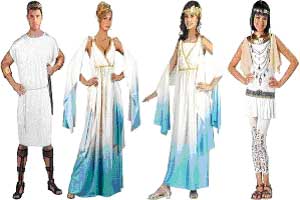
typical
clothes
on Atlantis
acc.to
this book
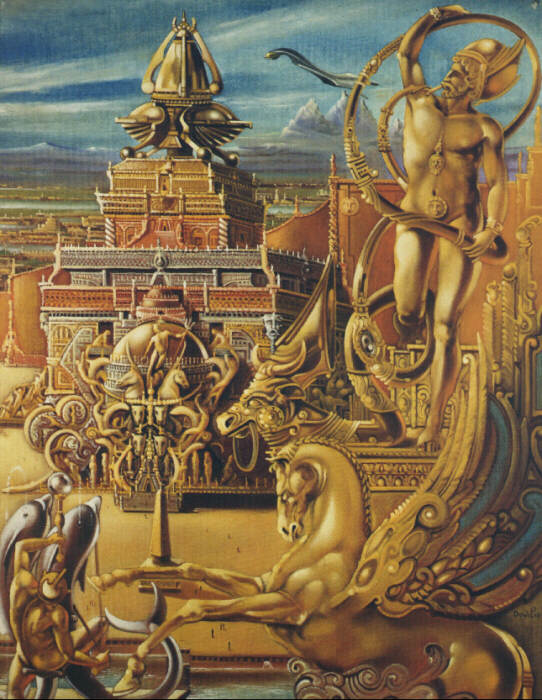
more
of
art-picture (+
below)of
this
artistic/aesthetic
life
on A - is
made
after a
timetravel to Atlantis - allegedly
done by an artist
connected
with
the
DAMANHUR-CENTER IN
ITALY
-
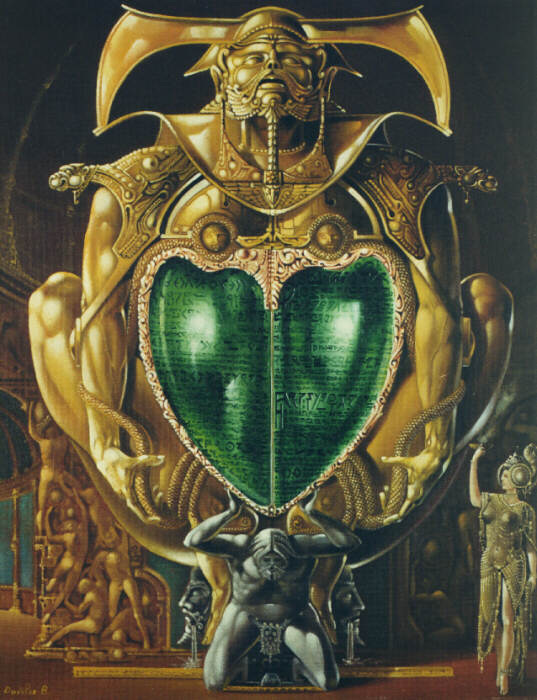
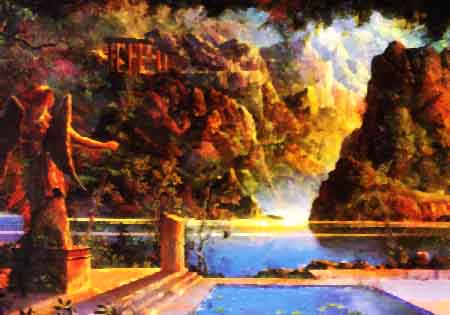
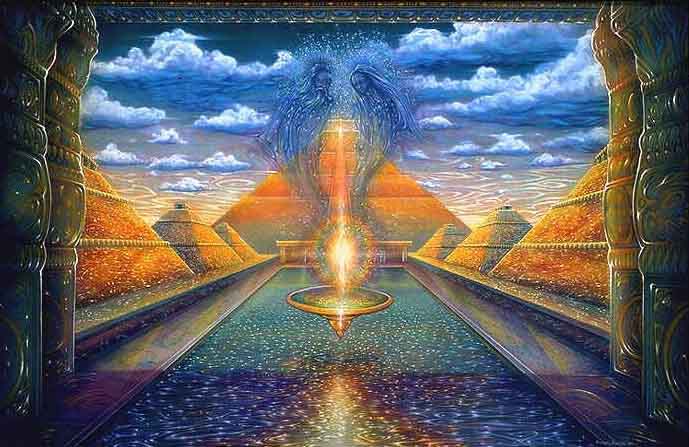
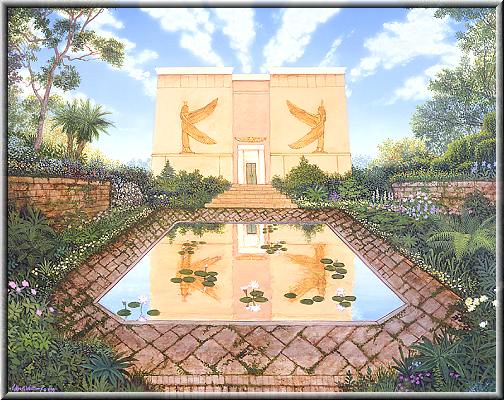


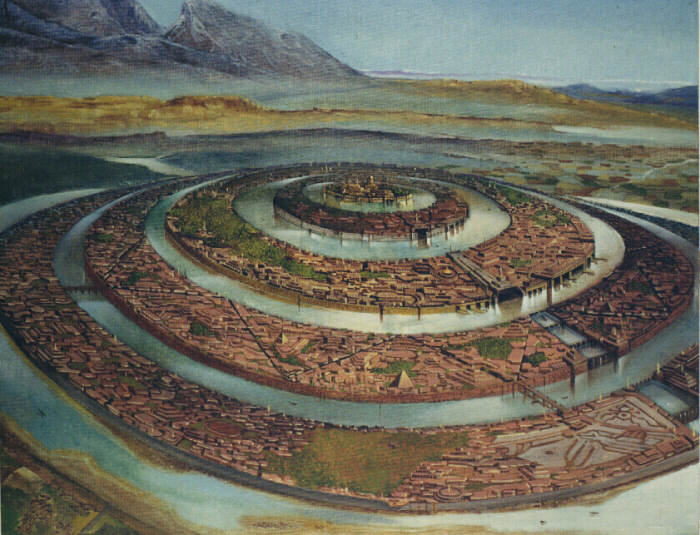 ' '
this art-picture of POSEIDON is made after a
timetravel to Atlantis - allegedly done by an artist connected with the
DAMANHUR-CENTER IN ITALY - make it bigger by cliking on it

picture up is from a UFO-CONTACT book from what
happend in the mid 60ths
|
A Dweller on Two Planets is one of the most important texts of the 19th Century Atlantis canon. The book was 'channeled' by Frederick S. Oliver. Oliver was born in Washington D.C. in 1866 and came to Yreka, California, with his parents when he was two years old. Yreka is just north of Mount Shasta, a huge dormant volcanic peak in Northern California. Gives a depiction of the high technology of Atlantis.
Oliver started to write this book at the age of eighteen, in 1883-4, while surveying the boundaries of his family's mining claim. He found himself uncontrollably in his notebook. He ran home in terror, where he sat down and let his hand write. These automatic writing spells continued for several years; he would write a few pages at a time. He completed writing this book in 1886, and died at the age of 33 in 1899.
A Dweller on Two Planets was finally published in 1905, by his mother Mary Elizabeth Manley-Oliver
extracts, giving a picture:
"Atlantis, or Poseid, was an empire whose subjects enjoyed the freedom allowed by the most limited monarchical rule, The general law of official succession presented to every male subject a chance for preferment to office. Even the emperor held an elective position, as also did his ministers, the Council of Ninety, or Princes of the Realm (p26)
*
"The possession of the elective power was vested in the two great social divisions, which embraced all classes of people, of either sex.
The two major social branches were known by the distinctive names of "Incala" and "Xioqua," or,
respectively, the priesthood and scientists. Every person had the option of entering either the College of Sciences, or that of Incal, or
both.
*
"Nor was race, color or sex considered, the only prerequisite being that the candidate for admission must be sixteen years of age, and the possessor of a good education obtained in the common schools, or at some of the lesser seats of collegiate learning, as the Xioquithlon in the capital city of some one of the Poseid States, as at Numea, Terna, Idosa, Corosa, or even at Marzeus' lower college, Marzeus being the principal art-manufacturing center of Atl. Seven years was the allotted term of study at the Great Xioquithlon, ten months in each year, divided into two sub-terms of five months each, devoted to active work, and one month allowed for recreation, half of it between each session. Any student might compete in the annual examination exercises, held at the end of the year or just preceding the vernal equinox
*
"only possessors of diplomas of the first class could be candidates for even the humblest official position.
*
The second-grade diploma did not confer political prestige, except in the matter of carrying with it the voting privilege, although if a person neither cared to be an office holder, nor to vote, the right to instruction in any educational branch was none the less a gratuitous privilege. Those, however, who only aspired to a limited education, with the purpose of more successfully pursuing a given business, as tuition in mineralogy by an intending miner, agriculture by a farmer, or botany by an ambitious gardener--had no voice in the
government.
*
HIS DRAMATIC MOUNTAINTRIP
"...Filled with such reflections as these, I climbed yet higher towards the top of the sky-piercing peak, near the apex of which I stood, for the dawn was not far distant, and I must be. on the highest stone to greet Incal (the sun) when He conquered Navaz, else
He--chief of all the manifest signs of the great and only true God, whose name He bore, whose shield He was--might not favorably regard my prayer. No, He must see that the supplicating youth spared no pains to do Him honor, because it was for this purpose only that I had climbed alone, amidst these solitudes, up that trackless steep of snow, beneath the starry dome of the skies.
*
Over these mountains, indeed not two miles from the base of my treasure peak, wound the emperor's highway to the great ocean, hundreds, of miles away on the other side of the Caiphalian plains....This, was the sole method of reaching the summit of the highest mountain of Poseid, or Atlantis, as thou callest the
island-continent.
*
on their belief: "...So with my belief in Incal, a belief shared by my country-people. Incal was a purely spiritual conception, and aside from the Eternal
Cause.."
*
When he was just on this mountain a volcanic eruption happend and lasted for a while. Afterwards a gray dust
covering all.
This eruption opens up the crust many places and so he discover a gold and silver-ore. He tries to make it his own, but when revealing this to some partners - they betray him.
From -CHAPTER II-"CAIPHUL" page41
The Atlantean people lived under a government having the character of a limited monarchy. Its official system recognized an emperor (whose position was an elective one, and not in any sense hereditary) and his ministers, known by a name signifying "The Council of Ninety," and also known as "Princes of the Realm." All of these officers had a life-tenure in office, except in cases of malfeasance, which term was strictly defined and its provisions severely enforced; and from the operation of the law relating thereto, no exaltation of position was sufficient to secure exemption for offenders. No governmental positions were made elective, with the exception of one ecclesiastical office.
**
ART AND DECORATING WITH SERPENT-FIGUERES:
BOOK describes a building ..."..a quadrangle in the steps, and the next, another serpent, and so around the building. This to give an idea of the tremendous parallelogram, encompassed with steps, guarded by monstrous ornamental, as well as useful, serpent forms, religious emblems, signifying not alone wisdom but also the appearance of a fiery serpent in the skies of the ancient earth, initiating the event of the separation of Man from God."
*
MORE descriptions on the Atlantean governmental buildings:
"Springing from the main roof of the palace arose graceful spires and towers, while the many jutting apartments, angles and groined arches, flying buttresses, cornices and multifarious architectural effects prevented any apparent heaviness in the design. Around the largest of the towers there extended from (p.44) bottom to top a winding staircase, conducting to the rail-enclosed space on its summit, one hundred feet above the aluminum sheathing or roofing-plates of the palace.
*
STONE-CUTTING EQUIPMENT.:
"...else we possessed peculiarly efficient stone-cutting machinery. This latter is the correct assumption, for our machinery for that purpose, like an almost infinite variety of other implements for every sort of service, was our pride amongst the nations. Let me here make an assertion, not for argument but to be understood in the light of subsequent chapters, namely, that if we as Atlanteans had not possessed this wide range of mechanical inventions and the inventive talent which gave us these triumphs, then neither would (p45)ye of this modern day have possession of a like creative ability, nor of any of the results of such genius.
Atlantis or Poseid as I (rø's interpretation of the txt) understand it - is here described as it was "nine thousand years before the waters of the ocean engulfed our fair land and left no sign" - it means ca 9000+12500 = 21500 years ago.
"nothing was left of those two cities hidden away beneath the ocean, lava and ashes"
Caiphul, the Royal City, the greatest of that ancient day;
*had a population of two million souls
*******
In preceding pages the promontory of Caiphul was described as reaching out into the ocean on a peninsula from the Caiphalian plain and as visible from a great distance at night because of the glow of light from the capital. For three hundred miles westward from Numea the peninsula projected outwards from the plain, averaging almost to its extreme cape - a breadth of fifty Miles and rising much like the chalk-cliffs of England directly from the ocean to a height of nearly one hundred feet, to reach a plain almost floor-like in its evenness. On the point of this great peninsula was Caiphul or "Atlan, Queen of the Wave." Beautiful, peaceful, with its wide spreading gardens of tropical loveliness.
"Beautiful, peaceful, with its wide spreading gardens of tropical loveliness, its broad avenues shaded by great trees, its artificial hills, the largest surmounted by governmental palaces, and pierced and terraced by, the avenues which radiated from the city-center like spokes in a wheel. Fifty miles these ran in one direction, while at right angles from them, traversing the breadth of the peninsula, forty miles in length, were the shortest avenues. Thus lay, like a splendid dream, this, the proudest city of that ancient world."
At no point did Caiphul approach the ocean nearer than five miles. Though it had no walls, around the whole city extended a huge moat, three-quarters of a mile broad by an average of sixty feet in depth and supplied by the waters of the Atlantic. On the north side, a great canal entered the moat-a canal in which the outflowing waters of a large river, the Nomis, created an outgoing current of considerable swiftness. A current was thus naturally made to cause suction through the entire circle of the moat, of which the ocean supply entered at an ingress on the south side. The old mout from A. old days, was ca 200km long around the city.
In this manner efflux into the sea of all the drainage of the artificial circular island on which stood the city was allowed. Immense pumping engines forced fresh ocean water through large stone pipes and conduits all over the city, flushing the drains, furnishing motive power for all requisite purposes, for electric(p47)fighting and electric services of vast variety--but enough.
THEY HAD ELECTRIC POWER ON ATLANTIS!
Electric service? Electric power? Indeed we had deepest knowledge of this motor-force of the universe; we used it in countless ways which have yet to be rediscovered in this modern world of ours, and ways, too, which are every day coming more and more into recollection as men and women of that past age reincarnate in this.
"We drew our electrical energies partly from the waves beating the ocean shores, more largely from the rise and fall of the tides; from mountain torrents and from chemicals; but chiefly from what might aptly be termed the "Night-Side of Nature." High-grade explosives were known to us, but our employment of them was of much wider range than thine. If thou couldst cause them substances gradually to yield up their vast imprisoned force without fear of an explosion, thinkest thou that thy machinery would long be propelled by clumsy, because ponderous, steam or electric engines?
("imprisoned force" - may be this statement aim of a kind of fission or fusion power-because it was apparently of small size, as he says it could be "carried in a handbag" rø.rem)
He also says they had "Night-Side forces".
*
The original object for which the great moat encircling the capital was excavated, had, since long centuries, been fulfilled. That purpose was purely maritime, in the days when ships had been used as carriers, before the later general use of aerial vessels; and it had served this purpose in such stead as to win for Caiphul its proud title "Sovereign of the Seas," a name retained even when the original uses of its moat had become a matter of history.
When the better means of transportation had supplanted the old, then the ships, which for ten centuries bad graced all the seas and waterways of the globe, had been suffered to decay or had been converted to other uses. Only, a few sails now roved the waters, and those were merely pleasure craft belonging to novelty-loving people of leisure, who thus indulged their taste for sport.
*
He says they had ended sea-fright-travel 700years ago.
*
A marked feature of Caiphul was the wealth and rare beauty of its trees and tropical shrubbery, lining the avenues, covering the multitudinous palace-crowned hills, many of which had been constructed to rise two or even three hundred feet (70-100m)above the level of the plain
*
ON LIGHTSOURCES; "tubes of crystal, absolutely exhausted of air, gave a continuous light derived from the "Night-Side" forces."
*
THE atlantean house-building-traditions was to avoid ugly and angular
houses.
*
Museums of art, edifices for histrionic (teatralsk) entertainment and other structures not designed for habitation were also in tasteful numbers.
OWNERSHIP ON ATLANTIS:- THE SOCIETY OWN IT ALL.
"The government pursued the paternalistic principle(faderlig prinsipp) so systematically as to have vested in itself the ownership of all the land, methods of public transit, and communications, in a word, all property.
The system was a most beneficent one, which no Poseida wanted to see disused or supplemented by any other. Did a citizen desire, a vailx (airship) for any use, he applied to the proper officials, who were on duty at numerous vailx-yards throughout the city. Or, to cultivate the land, he applied to the department of Soils and Tillage. Perhaps it was desired to manufacture some product; the machinery was for lease at the nominal rate necessary to meet working expenses and the salary of the officers overseeing that portion of the public property. Let these samples suffice. Enough, that no political harmony exists in this modern time of the world like that which sprang from this paternalism on the part of our elected officials. Governmental (p52) paternalism is a thing regarded with jealousy and semi-alarm by modem republics. But it is to-day a different quality from what it was then. Ours was a paternalism closely watched and duly checked by the suffragists (voters) of the nation, and its life was essentially exponent of true socialistic principles.
I have not even now been so precise in details as to explain many of the most peculiar adjustments maintained between the political parent and its children, nor between labor and capital. But neither can I do so in these pages with any degree of propriety, because this is not a plea for readoption, in this age of the world, of methods pursued in that remote period. Yet, this much I can say, not inappropriately at this juncture, that Poseid had not in my day, the modem, yet also very ancient, annoyance of labor strikes, blocking capital and enterprise, starving the artisan, and causing more suffering on the part of the poor than such annoyances can ever bring to the doors of the rich.
The secret of this immunity was not far to seek in a nation whose government was the voice of those people who possessed sufficient education to wield the power of franchise, and this, too, regardless of sex, because inborn in our national life was this principle: "An educational measuring-rod for every voter; the sex of the suffragist in immaterial." In such a nation, and under such a government, it were strange indeed if industrial inharmonies could long disturb social polity. The broad principle of equity between employer and employee governed in Poseid; it mattered not what a person did for another person, but the whole equation hinged on this question: Was some service performed by one person for another? If so, the fact that the service was or was not accomplished by physical labor counted for nothing. It might be equally a service deserving compensation whether it was a physical or a purely intellectual service; nor was it held to be important whether the employer represented, me or more individuals, or the employee one or more people.
Our local enactments on the subject of industrial equity were complete and rather voluminous. While I care not to give in detail a reproduction of what may be termed labor law, a (p53) few excerpts are worthy of place. It will be well to preface these with a short history of their enactment, and thus show how, in that olden time, labor troubles quite similar, and fully as menacing to peace and order as any modern industrial upheaval, were finally and equitably settled.
*
"...the government should establish a Department of Commissary, the duties of which should be to collect all statistics concerning the food products of commerce, also concerning all textile fabrics necessary for clothing and, in brief, all articles necessary for the proper social maintenance of individuals. On these statistical reports was to be founded (p55)an estimate of the cost of all such necessaries, amongst which books were reckoned as mental food, and the cost of these things for a year was calculated. Upon this calculation, day's wages were estimated by dividing the annual cost into the number of days. This rate was decided anew every ninety days, as the cost of the chief staples was found to fluctuate, hence the rate was not wholly stable, and the wages of any given three months' term might probably differ from those of any previous quarter.
Let me quote:
"See. VII, Art. V. Employers shall divide the gross profits of business operations upon the following plan: The wage, salary or emolument of each employee shall be paid in the sum directed by the quarterly estimate of living cost determined by the Department of Commissary. From the remainder, the amount of six parts in each hundred on the capital invested shall be set aside. This increment shall be and represent the employer's net profits. From the remaining income the running expenses shall be deducted, and of any sum thereafter remaining, one-half shall be invested to provide annuities for sick or disabled, or assurance for the dependents of deceased employees. The remaining half shall be periodically distributed amongst the employees on. the basis of their various compensations.
"See. VIII, Art. V. The whole of a body of employees is only equal to the Superintendent thereof. The Superintendent is equal to all the underlings. Hence, employers, when not themselves managers of the business, shall pay to managers a salary equal to the combined wages of the
subordinates."
*
THE RAIL-TRANSPORT-SYSTEM IN ATLANTIS- 3m above streetlevel.
"On the maps of the City Department of Transit these main and cross rails looked like the web of a garden spider. For each transit-district there were multitudes of carriages, having aut-odic mechanism, whereby they were made to speed at tremendous swiftness with their passengers; but collisions could not occur, as the conveying rods formed a double-track system.
*
"... ninety-one elective offices was in the gift of the people, while there were almost three hundred millions of Poseidi in Atl and her colonies, and according to a late census which I had seen, thirty-seven, nearly thirty-eight, millions of electors held First Degree diplomas, thus entitling them to hold elective offices, disposed me to think it extremely improbable that such a high preferment would ever fall to my lot".
-*-
He also mentions here that he started a study of geology and foreign languages on old Atl which he gained big advantages of in his life in
USA in the 1800ths.
He comment on this;
"Please not to regard this confession as due to boastfulness; it is not. I but make it in order to show thee, my friend, that thine own powers are not matters of heritage only, but recollected acquirements from some one, or it may be of all of thy past lives; also to give thee a hint of profit, to wit: that studies to-day undertaken, no matter how near to the evening of thy days, will surely bear fruit, not alone in thy present earth life, but in the experiences of subsequent incarnations also. We see with all we have seen, we do with all we have done, and we think with all we have thought"
(down p60)
|
|
next part
|
| link to the whole book in pdf |
|
main
|
|
|










